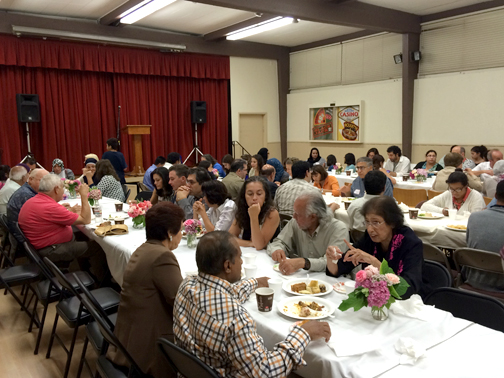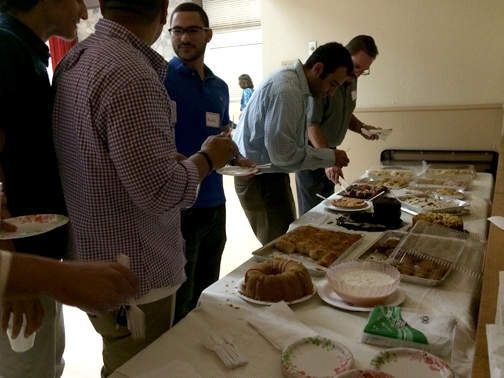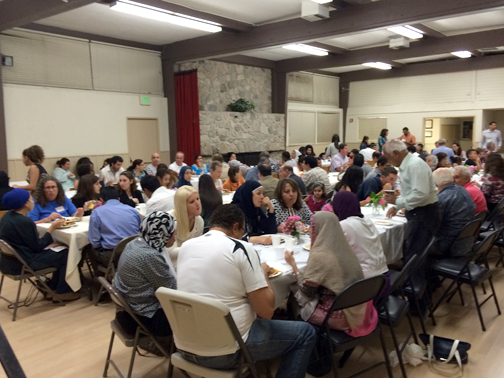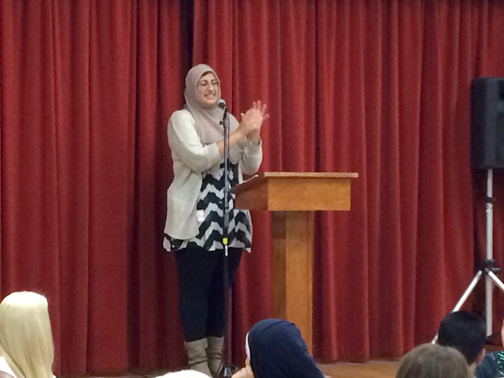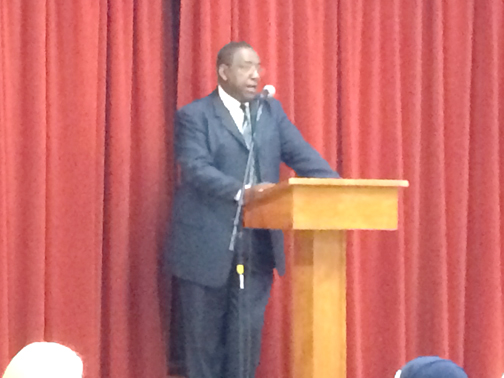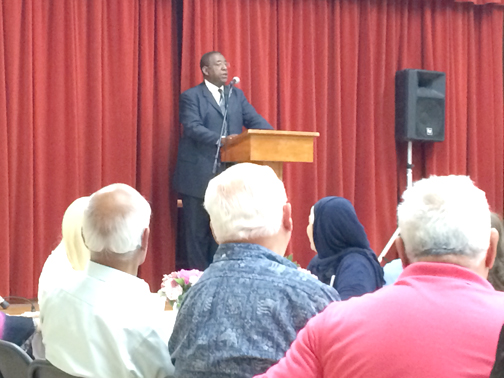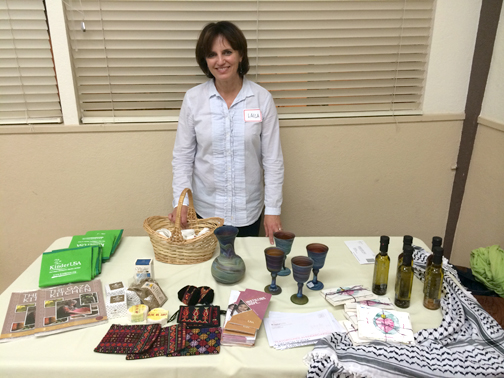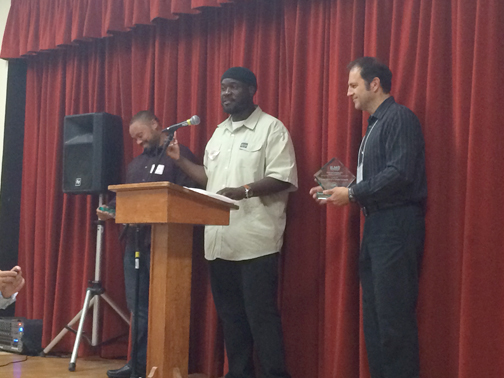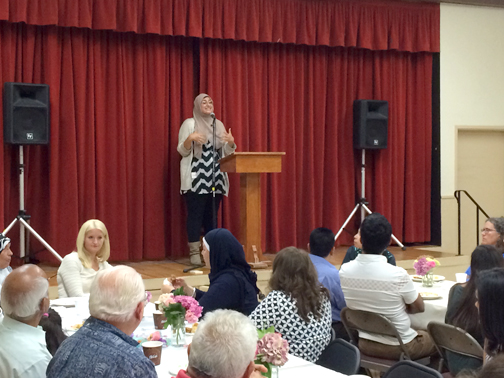
Photo by Charly SHELTON
By Michael J. ARVIZU
This week, the holy Islamic month of Ramadan, which began on the evening of June 28, enters its latter stages. By the time Ramadan ends on the evening of July 28, Muslims will have observed 31 days of dawn to dusk fasting, known in the Arabic language as sawm.
Sawm, one of the five pillars or obligations of Islam, is the ritual Ramadan fast that prohibits a Muslim from eating or drinking during daylight hours. Only at the breaking of the ritual fast before evening prayers – iftar – may a Muslim consume a full meal of food and drink. Traditionally, iftar is initiated by eating dates and other fruits before evening prayers are recited. And it is a personal and cultural choice how each person breaks his or her fast and with what foods.
On July 11, members of the Islamic Congregation of La Cañada Flintridge (ICLCF) shared the iftar with the local community at the eighth annual interfaith Ramadan potluck, held at the La Cañada Community Center.
Each year, guests of the interfaith potluck can expect to dine on an elaborate array of Middle Eastern and other international side and meat dishes. Most of these recipes were originally prepared decades ago in kitchens in Pakistan, India, Europe, and America, and passed down through the generations.
“We trust each other enough to exchange our culture as it is expressed through food,” said imam and Islamic community leader Tariq Ansaar Aquil, keynote speaker for this year’s interfaith potluck. His keynote was appropriately titled, “Fasting Is for God, and the Benefit Is for Humanity.”
“What we have done is said, ‘We have been eating this; we want to share this with someone else,” the imam said. “We want you to see what we have been experiencing. Sharing food is without precondition.”
Hala Karam, an ICLCF member and La Cañada resident, shared a squash with béchamel dish, made out of ground meat, onions and sautéed squash. The béchamel, made of flour, milk and butter, is baked and placed atop the meat, onions and squash.
“These are dishes from our culture,” said Karam, the daughter of a Syrian mother and Egyptian father. Karam learned how to make these dishes from her mother and tries to make them when she can.
“That’s what I love about this gathering,” she said. “We celebrate all of our blessings, but we taste so many wonderful dishes. It’s really a combination of the world.”
For happy occasions, Gail Kennard, a resident of Hollywood, enjoys making her own version of sweet potatoes, made with cinnamon, sugar, nutmeg, oranges and ginger. Her dish is especially high in carbohydrates, she said.
“It’s kind of evolved,” she said, as the call to evening prayers played in the background. “My mother used to make it. My friends make it. My aunts make it. I want it to represent my family history. It’s a good dish to eat when breaking the fast.”
Many dishes contained generous of amounts of spices, including curry, cumin, garlic, and parsley, as is common in most Middle Eastern cuisine.
Anjum Khan, an ICLCF member and La Cañada resident, served up beef stroganoff with a generous helping of beef, mushrooms, onions, ginger, garlic, mushrooms, and onions, giving it an Eastern feel, she said. Preparing the stroganoff required her to slow cook it for five hours.
“My family loves this, and I want everybody else to have it,” Khan said of her dish.
Daily fasting during Ramadan requires discipline to achieve, and breaking the fast at iftar requires much of the same discipline – that is, adherents to sawm do not necessarily make a mad dash for the food table as soon as evening prayers are over. And for some Muslims, fasting is so second nature that eyeing a table full of food is not enough to faze.
“I watch what I eat. I don’t eat a lot,” said Fatima Abdullah, 15. “I don’t get full.”
What can be dangerous, said Nassar Karam, an ICLCF member and La Cañada resident, is eating too much after fasting.
“It slows you down,” he said. In fact, Karam said, he was not at all hungry by the time the food was served.
“You can have any amount of food, and [it is] good food. It doesn’t bother us,” said Dr. Lareef Idroos, ICLCF member and La Cañada resident, as he glanced at the spread on the potluck table. “I think it’s the state of mind that you’re in that you feel that way.”
Karam echoed Idroos’ thoughts.
“Sometimes water is more important, because you get a little bit thirsty if you’re moving around,” he said. “Once you break your fast, it doesn’t take much to quench your hunger and thirst. You’re ready to go after that.”
Karam, a native of Egypt, preferred eating dates and lentil or chicken soup; Idroos, a native of Sri Lanka, preferred more spicy foods.
“Yesterday, we had barley soup at an Armenian restaurant. It was just great,” said Karam. “For me, once I have the soup, I’m good.”
For comments by Islamic community leader Tariq Ansaar Aquil on current world affairs read below.
Not All is Peaceful During Ramadan
By Michael J. ARVIZU
A weeklong offensive in the Gaza Strip has so far killed 185 people.
The now revealed as premeditated murder of three Israeli teenagers in the West Bank while they hitchhiked home from school – one of whom was an American citizen – has sparked continued outrage around the world.
And the death of a Palestinian teenager – burned alive, it is believed, to avenge the death of the three slain teenagers – was also planned in advance, according to international media reports. He was slain while waiting for prayer services to begin.
The holy Islamic month of Ramadan continues to be celebrated by Muslims around the world this week, as tensions in the Middle East between Israelis and Palestinians continue to mount with no end in sight.
Imam and Islamic community leader Tariq Ansaar Aquil, keynote speaker at this year’s eighth annual Islamic congregation of La Cañada Flintridge Interfaith Ramadan Potluck, feels that if it were possible to export the message of Ramadan to the Middle East and other troubled areas, “we probably would move a lot closer to conciliation and peace.”
The interfaith Ramadan potluck is a prime example of this message, Aquil said. By welcoming people of all faiths to partake in the iftar, one can see that peace among the peoples of the Middle East is possible.
“This evening, we have people who are Muslim, who are Christian, who are Jewish, and they’re sitting down having a meal together,” Aquil said. “No one is fighting, and they’re all here for one reason, and it’s just so that we can support each other and know more about each other.”
The premeditated murder of the four teenagers is “tragic,” Aquil said. “These types of incidents, happening during Ramadan, kind of remind us of why it is so important that we have a time out.”
This time, Aquil said, allows you to “reflect on where you are, where you’re going; reflect on how you handle things; reflect on your attitude toward people and things, and readjust yourself.”
“These tragic events are no respecters of tradition to things like Ramadan,” he said. “It’s unfortunate.”
Amid this violence, he said, the best people can do is be moral examples, and “hope that, when conflict areas look at us, they’re looking at a mirror that is reflecting that this is how you should be.”
If American faithful set the standard for a path to peace, they can “lead the way by example,” said Aquil, and promote alternatives to armed conflict.
He added that overall the conflict in the Middle East is such that neither side will win. In the end families and their children on both sides of the conflict will ultimately pay the price.
The United States, he said, should act as a moral authority in this conflict and lend itself as a facilitator of peace in areas of conflict, if they will accept us.
“This a lose-lose situation,” Aquil said. “And, as quickly as possible, we need to make it a win-win situation.”

